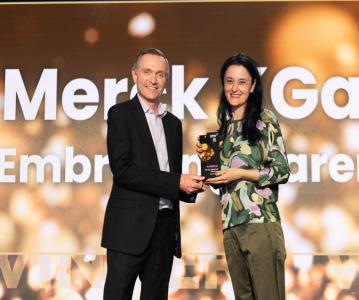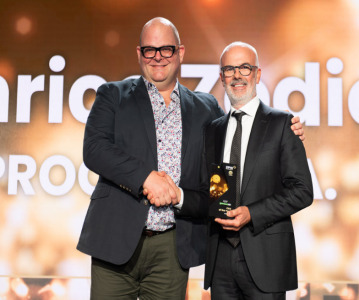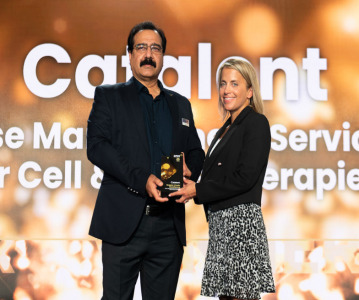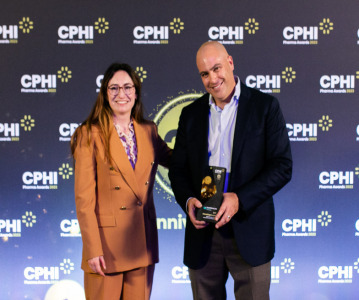CPHI Barcelona Keynote Preview – Next-Gen Biomanufacturing with AskBio

Ahead of her session on Next-Gen Biomanufacturing at CPHI Barcelona, Sheila Ann Mikhail (SM) – Co-Founder and Former CEO of AskBio – discusses gene therapy, AI and being an informed innovator when picking your manufacturing partner.
Because with a cell and gene therapy the manufacturing process is the product - It’s like growing crops where the environment conditions will have huge impact on the final product. She advises that no matter how good or experienced the CDMO partner is, it’s invaluable to also have a good base of CMC knowledge on the innovators’ side.
What themes are you looking to explore in your session at CPHI Barcelona?
In my session I want to really outline the state of the gene therapy research industry that is at a real inflection point now, in particular how to make these therapies more affordable and accessible to larger populations. We’ve made some incredible advancements in gene therapy; it’s no longer just the extremely complex solution, but now a viable option for rare diseases. The next step is figuring out how to scale-up and use gene therapy to treat pathway diseases, such as Parkinson’s. To do this, we need to make the technology affordable and accessible to patients, which means we need to drive down the cost of goods. I think manufacturing is vital to this, and I will specifically discuss the production system, optimising downstream processes, and standardising the chemistry, manufacturing, and control.
What type of innovations are you most excited for in the next two to three years?
In the space of viral-based gene therapy, I’m really interested in repeat dosing – it’s essential to guard against cell turnover. I see this as being achievable, as there’s a lot of different approaches people are deploying. I’m also interested in bringing the cost of goods down through better manufacturing. One way to do this is to change the formula – as I did for the Columbus Children’s Foundation. We put gene therapy drugs into something called thin film technology, which allows it to be stored at room temperature. This allows it to have a longer shelf life and is important to treat a large number of patients, which cuts down on manufacturing costs because you don’t have to be constantly manufacturing.
Lipid nanoparticles (LNPs) is another exciting area of innovation. While today they only work for delivery to the liver, there’s a lot of companies focusing on using LNP technology to deliver to other tissues. LNPs don’t have a lot of the toxicity associated with the adenovirus, and are less complex to manufacture. They also do not have the immune response and preexisting neutralising antibody issues.
In general, other areas of gene editing are showing a lot of promise. Base and prime editing are beginning to show their capabilities, we’re shifting from doing ex vivo to in vivo, and we’re beginning to have multiple tools we can use to treat genetic diseases. Our gene editing toolbox is growing, and we’re beginning to have more precise ways to treat different diseases, instead of the ‘one size fits all’ approach. I’m really excited to see where this goes in the future.
When do you think AI is going to come into play?
AI is being used now to design our capsids – we’re trying to figure out how to change the receptors on a viral vector to target certain tissues. With AI you can obviously screen many more options more efficiently. That’s how it’s being used today. In the future, I think it’s going to be used to help us accelerate clinical trials in terms of patient selection and simulation. We’ll also be able to have much more predictive capability in certain patient groups. We’ve been applying it for about 5 years now, and as our databases get more sophisticated, the AI is becoming more sophisticated. It is an essential component for the future of gene therapy and I look forward to continuing to apply it.
What are some industry setbacks you’ve noticed recently?
There’s been a lot of unbridled enthusiasm in the industry when the markets’ hot, and then afterwards we often see a cyclical reduction in funding – similar to what we have now. The lesson here is that when there is that excitement, I think the industry in general needs to be more skeptical and proceed cautiously with clinical trials. We lose credibility when we overhype things without investigating more thoroughly and having solid evidence to back our hypothesis. I have seen the for-profit motives push people to be more aggressive than they should be in both their investments in targets but also timelines, which ultimately means seeing too many product failures. ‘Less haste, more speed’ as the phrase goes should be the approach.
How important is building the right supply chain in progressing a product through development and onto commercialisation?
It’s absolutely essential. You have to be in charge of your manufacturing. When I was running Bamboo, I was absolutely insistent that we be in charge of as much manufacturing as we could, and this caused a lot of issues with funding. I backward integrated as much as I could, and wanted to control everything as much as possible. While it may not be the most cost effective way of doing things, it’s vital because the manufacturing process is the product. It’s like growing crops – everything can impact the final product. If you don’t control the supply chain carefully, you get a lot of contamination in your products – which then impacts the quality of the final product. CDMOs are still incredibly useful, but you have to be a knowledgeable buyer of CDMO services and an invested consumer. You have to have multiple meetings assessing progression, making sure they’re implementing your studies properly, and you have to be involved. This is the big message for me: you need to have that right partnership with your CDMOs so that you can advance as expeditiously as possible. It means being on site and working out problems together. It's also invaluable to have a good degree of CMC knowledge in your business, or with a consultant, even when using a really experienced CDMO – that way you have the best possible chance of overcoming any challenges as a group.
What are your suggestions for accelerating a pipeline of these products to the market?
Standardisation across the industry is key to process acceleration and that's something we all need to work toward. You want to develop a process that can be done once and then retrofitted to fit elsewhere. For example, cell lines. When I was at Bamboo I would use my client’s cell lines, which was difficult because we would constantly have to tweak unbaked cell lines and that development work would slow us down. What I later started doing was developing my own cell line, and then using it in manufacturing instead of our client’s cell line, because we understand our own cell line. While this may be unconventional, it’s definitely the approach that worked for us. It accelerates our programmes and our client’s programme, because we are no longer trying to figure out how to fix a broken cell line. If they want to do manufacturing in the future, we just give them the license right to our cell line and transfer the cells. It’s faster, it’s cheaper, it’s just better all around. Standardisation is really key to get products to market quicker.
Don’t miss the chance to hear Sheila Ann Mikhail’s upcoming keynote in person this October! Your CPHI Barcelona pass gives you full access to all conference sessions. See which attendee package works for you and register today.
Already registered? CPHI Barcelona is bringing you a full conference track dedicated to Next-Generation Manufacturing. See the full agenda here.
Related News
-
News CPHI Pharma Awards 2023 – Sustainability winners: Schneider Electric
After another year of impressive nominations for the CPHI Pharma Awards our winners were announced at CPHI Barcelona in October 2023. In this series of interviews, we speak to the people and teams behind the award-winning projects, concepts, and techno... -
News CPHI Pharma Awards 2023 – At the Heart of Pharma winners: Merck KGaA
After another year of impressive nominations for the CPHI Pharma Awards our winners were announced at CPHI Barcelona in October 2023. In this series of interviews, we speak to the people and teams behind the award-winning projects, concepts, and techno... -
News CPHI Pharma Awards 2023 – Packaging & Machinery Winner: Gasporox
After another year of impressive nominations for the CPHI Pharma Awards our winners were announced at CPHI Barcelona in October 2023. In this series of interviews, we speak to the people and teams behind the award-winning projects, concepts, and techno... -
News CPHI Pharma Awards 2023 – CEO of the Year Winner: Enrico Zodio, PROCOS S.P.A.
After another year of impressive nominations for the CPHI Pharma Awards our winners were announced at CPHI Barcelona in October 2023. In this series of interviews, we speak to the people and teams behind the award-winning projects, concepts, technologi... -
News CPHI Pharma Awards 2023 – Supply Chain Excellence Winners: Catalent Case Management Services
After another year of impressive nominations for the CPHI Pharma Awards our winners were announced at CPHI Barcelona in October. In this series of interviews, we speak to the people and teams behind the award-winning projects, concepts, and technologie... -
News CPHI Pharma Awards 2023 – API Development and Innovation Winners: Snapdragon Chemistry, a Cambrex Company
After another year of impressive nominations for the CPHI Pharma Awards our winners were announced at CPHI Barcelona in October. In this series of interviews, we speak to the teams behind the award-winning projects, concepts, and technologies. -
News Navigating the Future: Challenges and Opportunities in Pharma Innovation and Investment – CPHI Barcelona 2023 Roundtable Report
In this comprehensive downloadable report, hear from a range of experts in finance and investment in the pharma industry on what investment trends will be shaping the future of the industry, in Catalonia, and the wider world. -
News CPHI Barcelona: Outsourcing in Manufacturing Operations
During CPHI Barcelona 2023, insightful content sessions offered attendees the chance to explore trending topics with expert speakers and panellists. Here, we summarise what the pharma industry and supply chain are talking about the most.
Position your company at the heart of the global Pharma industry with a CPHI Online membership
-
Your products and solutions visible to thousands of visitors within the largest Pharma marketplace
-
Generate high-quality, engaged leads for your business, all year round
-
Promote your business as the industry’s thought-leader by hosting your reports, brochures and videos within your profile
-
Your company’s profile boosted at all participating CPHI events
-
An easy-to-use platform with a detailed dashboard showing your leads and performance


.png)




